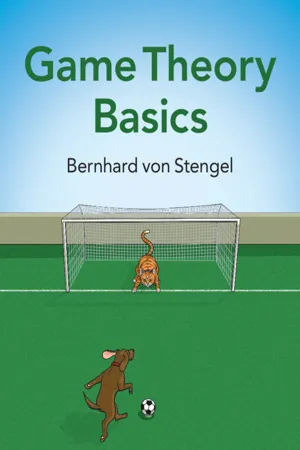Game Theory Basics
About this book
Game theory is the science of interaction. This textbook, derived from courses taught by the author and developed over several years, is a comprehensive, straightforward introduction to the mathematics of non-cooperative games. It teaches what every game theorist should know: the important ideas and results on strategies, game trees, utility theory, imperfect information, and Nash equilibrium. The proofs of these results, in particular existence of an equilibrium via fixed points, and an elegant direct proof of the minimax theorem for zero-sum games, are presented in a self-contained, accessible way. This is complemented by chapters on combinatorial games like Go; and, it has introductions to algorithmic game theory, traffic games, and the geometry of two-player games. This detailed and lively text requires minimal mathematical background and includes many examples, exercises, and pictures. It is suitable for self-study or introductory courses in mathematics, computer science, or economics departments.
Tools to learn more effectively

Saving Books

Keyword Search

Annotating Text

Listen to it instead
Information
Table of contents
- Cover
- Half-title Page
- Title Page
- Copyright Page
- Contents
- Preface
- 1 Nim and Combinatorial Games
- 2 Congestion Games
- 3 Games in Strategic Form
- 4 Game Trees with Perfect Information
- 5 Expected Utility
- 6 Mixed Equilibrium
- 7 Brouwer’s Fixed-Point Theorem
- 8 Zero-Sum Games
- 9 Geometry of Equilibria in Bimatrix Games
- 10 Game Trees with Imperfect Information
- 11 Bargaining
- 12 Correlated Equilibrium
- References
- Index
Frequently asked questions
- Essential is ideal for learners and professionals who enjoy exploring a wide range of subjects. Access the Essential Library with 800,000+ trusted titles and best-sellers across business, personal growth, and the humanities. Includes unlimited reading time and Standard Read Aloud voice.
- Complete: Perfect for advanced learners and researchers needing full, unrestricted access. Unlock 1.4M+ books across hundreds of subjects, including academic and specialized titles. The Complete Plan also includes advanced features like Premium Read Aloud and Research Assistant.
Please note we cannot support devices running on iOS 13 and Android 7 or earlier. Learn more about using the app
